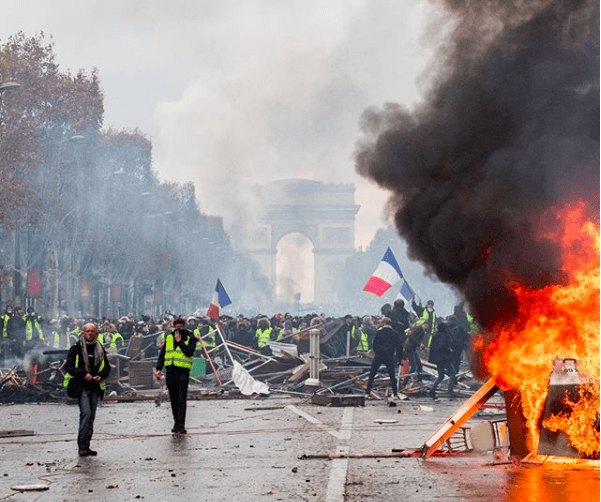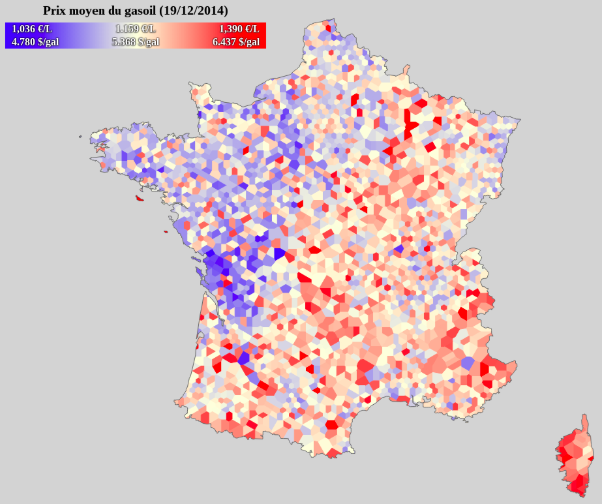France’s Fiery Fuel Tax Protests
November 29, 2018 | Expert Insights

The “Yellow Vest” protests in France have seen thousands take to the streets across the country over rising fuel prices. Embattled French President Emmanuel Macron has said he will not abandon the controversial fuel tax, as he laid out France's future energy strategy.
Background
Diesel prices in France have surged 16 per cent this year from an average 1.24 euros per liter to 1.48 euros, hitting 1.53 euros in October, according to UFIP, France's oil industry federation.
The price hike is largely caused by a leap in the wholesale price of oil - with Brent crude oil, a benchmark for worldwide oil purchases, increasing by more than 20 per cent in the first half of 2018 from around $60 a barrel to a peak of $86.07 in early October.
French President Emanuel Macron, as part of his economic reforms, announced higher taxes on gas earlier this year to minimise France’s reliance on fossil fuels. The tax will increase the price of fuel by about 30 cents per gallon and will continue to rise over the next few years, the French government says. Gas already costs about $7.06 per gallon in France. The president’s approval ratings have dropped to 26 per cent 19 months into his presidency. This is due to several factors, including the slow growth of the French economy; most of the growth is centred in its major cities, like Paris, but others on the periphery and rural communities haven’t seen as much profit.
In his efforts to reform the French economy, Macron has ended longstanding benefits and labour protections and made it easier for companies to hire and fire employees.

Analysis
Mass demonstrations causing roadblocks across Paris are part of the "gilets jaunes" or "yellow vests" movement, which opposes mounting gas prices and eco-taxes on polluting forms of transport. A protester was accidentally run over and killed by a car during a demonstration over rising fuel prices. A further 227 people were injured in protests across the country, and 73 people were taken into police custody, the French Interior Ministry said in a statement. About 280,000 people participated in more than 2,000 demonstrations.
Tear gas and a water cannon were used to disperse crowds after barricades were erected on the capital's streets and a small number of protesters tried to break a security cordon. The growing resentment has also been a springboard for partisan political attacks, with opponents of Macron's centrist En Marche party attempting to energize their bases to fuel further revolt.
"This government hasn't understood the anger of the French," Olivier Faure, head of the French Socialist Party, said Wednesday. "Macron has not heard the French," said Laurent Wauquiez, leader of the centre-right party Les Républicains.
On 27 November, 12 of France's 13 regional leaders called on Mr. Macron to reconsider the fuel tax.
Counterpoint
Emmanuel Macron has said he understands the complaints of anti-government protesters who have blockaded French roads and petrol depots over fuel tax rises, and that he was open to ideas and revising how the fuel tax was applied. He also announced that France would close all coal power stations by 2022, along with a number of nuclear plants.
In a speech on France’s transition to renewable energy on Tuesday, the 40-year-old president addressed accusations that he had failed to listen to the hundreds of thousands of people who over 10 days had blockaded roads across France and who marched last weekend in Paris, where barricades burned on the Champs Élysées.
In a display of humility and deliberate empathy with the anger among voters living outside of France’s big cities, Macron said his administration needed to be smarter in its policymaking to avoid a “two-speed France” emerging, where workers in outer-urban areas felt left behind.
“I have seen, like many French people, the difficulties for people who have to drive a lot and have problems making ends meet at the end of the month,” he said.
He acknowledged the increase in diesel tax, which coincided with a rise in pump prices, had inflicted more pain than anticipated. Nonetheless, the president was unwilling to revoke the new taxes. “We must not change course, because the policy direction is right and necessary. I believe very profoundly that we can transform this anger into the solution,” he said.
Assessment
Our assessment is that the yellow vest protests are likely to be one of the toughest tests of Emmanuel Macron's 19-month presidency. We believe Mr. Macron has tried to set himself apart from previous French presidents by refusing to alter policy decisions over public uproar; while his tenacity is commendable, refusal to make minor concessions would be used against him by opponents and, in our opinion, could do more harm than good.








Comments